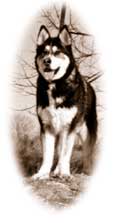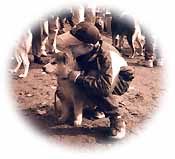         |
Because Dogs Are For A Lifetime...
Our Origins... In 1990, Chelsea, a year-old female Malamute, was brought to the vet for euthanasia. She was a sound, healthy dog, but her owners didn't want her anymore. The vet thought Chelsea deserved a second chance, and called one of her clients, a Malamute breeder, with the hope that they would help to find a new home for Chelsea. They did better; they adopted her into their own family of dogs. After all, they reasoned, this was a one-time deal; it would never happen again. Were they ever wrong!
 Word quickly spread that these people would help Malamutes in trouble. Soon they were getting calls from owners who couldn't keep their dogs and from shelters seeking help placing strays. From 1990 to 1993, 41 Mals were placed in new homes, with the numbers growing each year. In 1993, the Alaskan Malamute HELP League was formed to provide support and a formal structure for the founders' rescue efforts. A total of 348 Mals had received some form of assistance by the end of 1997; 99 of them spent time as guests of the HELP League. Word quickly spread that these people would help Malamutes in trouble. Soon they were getting calls from owners who couldn't keep their dogs and from shelters seeking help placing strays. From 1990 to 1993, 41 Mals were placed in new homes, with the numbers growing each year. In 1993, the Alaskan Malamute HELP League was formed to provide support and a formal structure for the founders' rescue efforts. A total of 348 Mals had received some form of assistance by the end of 1997; 99 of them spent time as guests of the HELP League.
We now have members across Canada and the U.S.A. who support our activities. Our quarterly newsletter keeps them informed and entertained, and there are regular get-togethers for sledding, hiking, weight pulling and skijoring. Certificates of achievement offered through our Working Dog program encourage and recognize their dogs' accomplishments.
We are always available to provide advice and information to Malamute owners, and have developed a rapidly expanding series of educational brochures. They deal with topics ranging from choosing a responsible Malamute breeder to training tips, as well as information about various activities suitable for Malamutes. Rescue will always be our main focus: assisting Malamutes, owners and animal shelters; caring for and placing dogs in appropriate homes.
Working With Shelters...
- Reuniting lost dogs with their owners: Records are kept of the many owners who contact us when their dogs go missing. We are happy to share this information with shelters trying to locate strays' owners.
- Referring potential adopters: We occasionally have a waiting list of people who wish to adopt an adult Malamute. If you have a healthy, mentally sound Mal in your shelter, we will share that information with people on our list.
- Providing support for new owners: We offer educational support for all Malamute owners. Our volunteers include conscientious breeders with years of experience who can share advice on all aspects of Malamute ownership. We also organize weekend events to introduce people to different activities that they can enjoy with their Mals. Shelters are asked to give our brochures to anyone who adopts a Malamute.
- Evaluating Malamutes: Even at the best of times, Malamutes can be a handful! We have met, and successfully placed, a number of Mals who had been classed as "unplaceable" by shelter staff. We encourage shelters to draw on our knowledge and experience to help determine whether or not a Mal is adoptable.
- Care, rehabilitation and placement: We believe that every unwanted Mal deserves a second chance. If a Mal in your shelter is running out of time and you are no longer able to care for him, call us! The HELP League will take over the provision of housing and care. We will do a complete evaluation and will work to resolve any health and/or behaviour problems which may be present. Once the dog is healthy and mentally sound (or may be successfully treated for a minor, chronic disorder which will not have a negative impact on his or his family's quality of life), we will find a new home for him. Healthy, sound dogs stay with us until they are adopted: there is never a time limit on their stay with the HELP League.
Working With Owners...
Owners often encounter trouble with their Malamutes. They may have problems with training, providing enough exercise or coping with all that hair every spring. Some find that they are simply unable to keep their dogs. The following services are available to all Malamute owners:
- Education and support: Our volunteers are always available to provide advice about training and behaviour problems. We have experience with many different activities to help lively young Mals burn up some of their overwhelming energy. We also have access to a wide network of experts to help find answers to more difficult questions.
- Finding lost dogs: We can offer advice about how to conduct a search for a lost dog. We also cooperate with animal shelters who are trying to locate strays' owners.
- Referral to potential new owners: Sometimes, it is impossible for an owner to keep their Malamute. If they are able to continue to care for their pet while trying to find a new home, and if the dog is healthy and mentally sound, we will try to provide referrals to people who wish to adopt an adult Malamute. If a clear photograph is provided, we will list the Mal on our web site.
- Helping owners keep their dogs: We make every effort to provide advice which will help owners to keep their dogs. Many problems respond to some basic training and extra exercise and nothing pleases us more than to be able to help human and malamute learn to enjoy life together. In rare cases, when the problem is insurmountable, we will consider accepting these dogs into our care.
-

Santana's Story...
Wherein we learn about persistence, patience, hope, and above all, the folly of describing a Malamute only as a Malamute...
Santana came to us in January 1995. She had been in a shelter since August 1994, but because of her advanced age and grumpy personality, shelter workers were unable to find a home for her. She had been well cared for, though: a much loved pet obviously lurked beneath that crusty exterior. So, when her time in the shelter finally ran out, the HELP League was asked to step in. After she came into our care, Santana's grumping continued, and it looked as if she would become a permanent resident. Foster parents paid for her care and Santana settled in for a long stay.
Then, in August 1995, a prospective adopter was touring the kennel. As Santana came into view, he stopped and stared. She was a year older, and much fatter, but she was unquestionably the dog who had been stolen from him in July 1994. After months of searching, her owner had given up: Santana had apparently vanished without a trace.
We learned that the owner had contacted the shelter where Santana had been housed for five months - not just once, but many times. Unfortunately, shelter staff had mistakenly identified her as a "husky", in spite of the fact that she is a registered Malamute. When her owner called, looking for his Malamute, nobody thought to suggest he check out the grouchy "husky" in the back room.
Santana's story had a happy ending. She was overjoyed to be reunited with her owner — her grumpiness vanished and her ten year old body felt young again. We wish that all of the "Santanas" out there could be this lucky!
Remember this story if you lose your Mal, or if a stray northern breed arrives at your shelter. Use very general terms when you describe them. Sure, call a Malamute a Malamute, but also include a description like "large, husky-type northern dog". Be persistent -- owners should investigate any dog who may fit their dog's description, no matter how remotely, just as shelter workers must encourage owners to visit shelters often and see all of the residents. Never lose hope!

|

